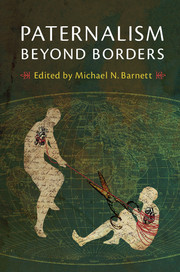Introduction: International Paternalism: Framing the Debate
Published online by Cambridge University Press: 01 December 2016
Summary
We live in a world in which the international community vigorously protects and promotes the quality of human life. Within twenty-four hours of a natural disaster, emergency relief organizations deploy armies of aid workers to provide medical care to the survivors. The International Committee for the Red Cross visits prisoners of war and political prisoners to ensure that their basic rights, as listed in the Geneva Conventions, are honored. The international community now has a “responsibility to protect” populations who are victims of genocide, war crimes, and crimes against humanity. Peacebuilders in post-conflict countries aspire to help societies remove the root causes of conflict and to create the conditions for a full, just, and lasting peace. Organizations, such as the United Nations Commission for Refugees and Refugees International, provide direct assistance to refugees and other displaced peoples. Thousands of rights-based organizations, including Fédération Internationale des Ligues des Droits de l'Homme and Amnesty International, struggle to protect children, women, gays, and other vulnerable populations. Labor and rights-oriented monitoring agencies organize to improve the conditions of workers. Often operating in the shadow of major global initiatives, such as the Millennium Development Goals, development organizations provide all manner of aid, including job training, micro-financing, and technical assistance. The World Health Organization, the Gates Foundation, and other global health organizations cover all dimensions of physical and mental health, from reproductive health, to trauma counseling, to the containment and eradication of disease. Educators in the West collect textbooks for internationally funded schools in sub-Saharan Africa. Health and human rights organizations monitor and report on organ trafficking, including trying to stop the world's rich from treating the world's poor as a supermarket for body parts. Everywhere we look the international community is committed to the protection of people from unfavorable conditions, from others, and from themselves.
These practices of care are inspired by, and are the realization of, a growing sense of humanity. Historically speaking, it was not too long ago that compassion was largely circumscribed by boundaries of family, residence, and religion. Certainly there were real material limitations placed on the lengths that individuals and communities could go to help distant strangers. Until there were advances in communication technologies, it was impossible to know about the hardships experienced by others in faraway lands when it was happening.
- Type
- Chapter
- Information
- Paternalism beyond Borders , pp. 1 - 44Publisher: Cambridge University PressPrint publication year: 2016
- 4
- Cited by



